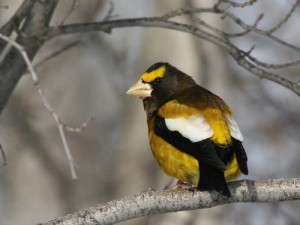Learn to Record Birds

Some people have asked how I learned to record bird sounds. The answer is simple: in 2004, I took the Macaulay Library’s annual Nature Sound Recording Course in California. If you’re interested in getting into audio recording in nature, I can’t recommend this course more highly.
The price ($945 in 2010) is tremendously reasonable, given that it includes all the personal attention, intensive training, transportation to local recording locations, amazing (though rustic) accommodations, and great food that you get for the entire week of the course. It’s held in a spectacular area of the country that allows participants to record in at least four completely different habitats in as many days, all the way from the sagebrush steppe and cattail marshes of the valley floor to the high-elevation spruce-fir forest and willow carrs of Yuba Pass and vicinity.
I arrived at the Sierra Nevada Field Campus never having wielded a microphone of any kind, never having worn recordist’s headphones, never having analyzed a single bird sound spectrographically. I didn’t own a single piece of recording equipment. Luckily, however, the Library was able to lend me some. In fact they lent me several different rigs over the course of the week, so that I gained experience recording in both analog and digital formats, through both parabolic and shotgun microphones. In a way, since I had already decided I wanted to save money to buy equipment, the workshop turned into a kind of extended test drive of potential future purchases. I was able to keep all the recordings I made, and they became the nucleus of the recording library I’ve been compiling since then.
If you get a chance to participate in this workshop, jump at it. If there’s one thing this world definitely does need in my opinion, it’s more people running around pointing microphones at birds!
7 thoughts on “Learn to Record Birds”
Thanks for posting this, Nathan. I’m actually very intrigued by this, although still unsure about whether I should distract myself even more than I already do right now. I guess part of my uncertainty stems from not really knowing the answer to the question of why the world needs more recordists. I mean, I see so much great work already being done by you and so many others, I just don’t have a sense yet of what I could contribute to the field. I know that it would achieve the end at least of simply amusing myself … but I’m not sure that’s enough to make me take the plunge.
I appreciate your struggle. You’re hesitating for the same reason that I hesitated about (and eventually gave up on) bird photography. I simply didn’t see the point, since everybody else had better cameras and more skill than I did. I, too, wanted to contribute, not just amuse myself.
The good news is that recording is a whole new frontier compared to photography. It’s hard to walk out your front door in Colorado and snap a picture of a unique, never-before-photographed bird plumage. But it’s relatively easy to find a bird making a never-before-recorded sound. Nobody, or practically nobody, has the flight calls of MacGillivray’s Warbler. Nobody knows the repertoire size of Virginia’s Warbler or Dickcissel (just to name a couple off the top of my head). And when it comes to begging calls, you’re highly likely to be the first one on your block (or in your state or nation) with a recording, no matter what species you’re dealing with.
Our knowledge of the vocalizations of many common birds is supposedly deep but in reality surprisingly shallow. Take goldfinches as an example. Everything that’s ever been published on their vocalizations comes out of Ellen Coutlee’s work in the late ’60s and early ’70s. Since then, nobody’s done anything with goldfinch vocalizations, but somebody needs to, because her work leaves lots of questions unanswered, including some that we could solve if we just had more recordings of Lesser and American goldfinches of known sex, with behavioral notes attached.
I’ve been meaning to write a blog post trying to highlight all the things we don’t know about bird sounds — all the mysteries an amateur recordist could tackle. Frankly, there are so many that it’s daunting. I’ve even considered devoting an entire section of this website to it.
Having said all that, I realize that I’ve just given you my answer as to why the world needs more recordists…which may not be the one that motivates you. Keep thinking about it. You’re asking the right question, in my view. Thanks for the post.
Nathan, I for one would love to see that blog post you’ve been meaning to write. I am already thinking hard about how I want to spend my time spring/summer 2010, but I have a lot of indecision in this regard. I want to make my time in the field count. I’d like to hear more about areas that amateur recordists could contribute in a meaningful way.
Only recently found your blog and it’s great! I too am looking forward to that blog post. I am going to look back through your previous posts but maybe you can say here – do you have some posts on equipment, especially for beginners?
Cheers,
Steve
Steve,
I do have some info on this site, mostly under the “Recording” category. The “Recordist Profiles” will probably be of the most use to you. I hope to get some more beginning info up soon. In the meantime, some diligent searching on the web (and, especially, within the archives of the Naturerecordists listserv) should give you a good start!
Just to follow up…I’m taking the plunge after all. I’ve reserved a spot in the 2010 workshop. I have to say, I don’t think I would have even known to look for this offering if you hadn’t posted about it. I even gave you a nod on my own sporadically-updated blog. Thanks!
Comments are closed.